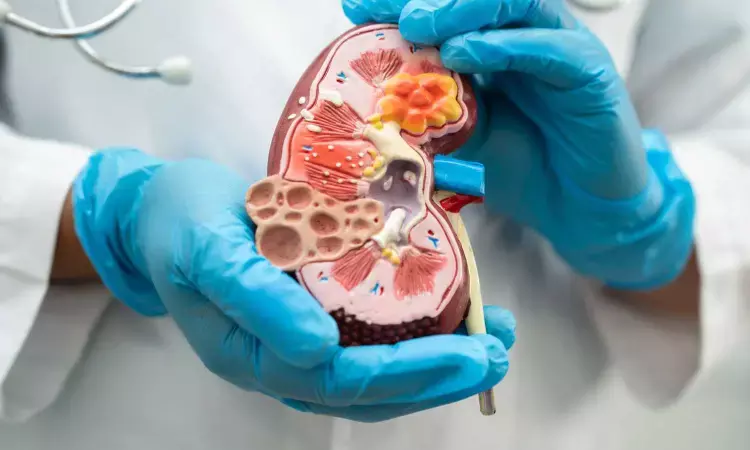- Home
- Medical news & Guidelines
- Anesthesiology
- Cardiology and CTVS
- Critical Care
- Dentistry
- Dermatology
- Diabetes and Endocrinology
- ENT
- Gastroenterology
- Medicine
- Nephrology
- Neurology
- Obstretics-Gynaecology
- Oncology
- Ophthalmology
- Orthopaedics
- Pediatrics-Neonatology
- Psychiatry
- Pulmonology
- Radiology
- Surgery
- Urology
- Laboratory Medicine
- Diet
- Nursing
- Paramedical
- Physiotherapy
- Health news
- Fact Check
- Bone Health Fact Check
- Brain Health Fact Check
- Cancer Related Fact Check
- Child Care Fact Check
- Dental and oral health fact check
- Diabetes and metabolic health fact check
- Diet and Nutrition Fact Check
- Eye and ENT Care Fact Check
- Fitness fact check
- Gut health fact check
- Heart health fact check
- Kidney health fact check
- Medical education fact check
- Men's health fact check
- Respiratory fact check
- Skin and hair care fact check
- Vaccine and Immunization fact check
- Women's health fact check
- AYUSH
- State News
- Andaman and Nicobar Islands
- Andhra Pradesh
- Arunachal Pradesh
- Assam
- Bihar
- Chandigarh
- Chattisgarh
- Dadra and Nagar Haveli
- Daman and Diu
- Delhi
- Goa
- Gujarat
- Haryana
- Himachal Pradesh
- Jammu & Kashmir
- Jharkhand
- Karnataka
- Kerala
- Ladakh
- Lakshadweep
- Madhya Pradesh
- Maharashtra
- Manipur
- Meghalaya
- Mizoram
- Nagaland
- Odisha
- Puducherry
- Punjab
- Rajasthan
- Sikkim
- Tamil Nadu
- Telangana
- Tripura
- Uttar Pradesh
- Uttrakhand
- West Bengal
- Medical Education
- Industry
Kidney transplantation between donors and recipients with HIV safe, suggests NEJM study

Kidney transplantation from deceased donors with HIV (HIV D+) to recipients with HIV (HIV R+) was safe and comparable to kidney transplantation from donors without HIV (HIV D-) in a multicenter observational study in the United States. The clinical outcomes observed were consistent with smaller pilot studies, but this National Institutes of Health (NIH)-funded clinical trial was the first statistically powered to demonstrate noninferiority, which means that an approach being studied is as good as standard clinical practice. The results were published today in the New England Journal of Medicine.
Kidney transplants offer a survival benefit to people with HIV and end-stage kidney disease, but an organ shortage limits access. In addition, people with HIV face a higher risk of death while on the organ waitlist and have lower access to transplants than people without HIV. To help address these disparities, the HIV Organ Policy Equity Act (HOPE) was implemented in 2015 and legalized transplants between donors and recipients with HIV. Currently, the HOPE Act limits this practice to research settings to carefully evaluate outcomes. These include post-transplant survival, post-transplant kidney function (also known as graft survival), and kidney rejection. Research studies also assess unique potential risks of this practice, such as acquiring a second, genetically distinct HIV strain from the donor that could affect the recipient’s HIV disease.
The present study enrolled 198 adults with HIV and end-stage kidney disease who received kidney transplants at 26 centers, comparing the outcomes of 99 study participants who had donors with HIV versus 99 whose donors did not have HIV. Transplants were completed between April 2018 and September 2021 and recipients were monitored subsequently for about three years.
The outcomes for overall survival, graft survival, and rejection events were similar between the two groups. After one year post-transplant, recipient survival was 94% in HIV D+/R+ and 95% in HIV D-/R+. At three years, recipient survival rates were 85% in HIV D+/R+ and 87% in HIV D-/R+. After one year post-transplant, graft survival was 93% in HIV D+/R+ and 90% HIV D-/R+. At three years post-transplant, graft survival rates were 84% in HIV D+/R+ and 80% in HIV D-/R+. Finally, at one year post-transplant, rejection incidence was 13% in HIV D+/R+ and 21% HIV D-/R+ and at three years, 13% in HIV D+/R+ versus 21% in HIV D-/R+. Rates of serious adverse events, surgical site infections, surgical/vascular complications, and cancer were also comparable between the two groups. One case of a recipient who may have acquired a second genetically distinct HIV strain from their donor was observed, but there were no notable clinical consequences.
Overall, the findings show kidney transplantation between donors and recipients with HIV was safe and noninferior to transplantation from donors without HIV. According to the authors, these findings offer evidence to support the expansion of the practice outside of research settings.
Reference:
Christine M. Durand, Allan Massie, Sander Florman, Safety of Kidney Transplantation from Donors with HIV, New England Journal of Medicine, DOI: 10.1056/NEJMoa2403733.
Dr Kamal Kant Kohli-MBBS, DTCD- a chest specialist with more than 30 years of practice and a flair for writing clinical articles, Dr Kamal Kant Kohli joined Medical Dialogues as a Chief Editor of Medical News. Besides writing articles, as an editor, he proofreads and verifies all the medical content published on Medical Dialogues including those coming from journals, studies,medical conferences,guidelines etc. Email: drkohli@medicaldialogues.in. Contact no. 011-43720751


